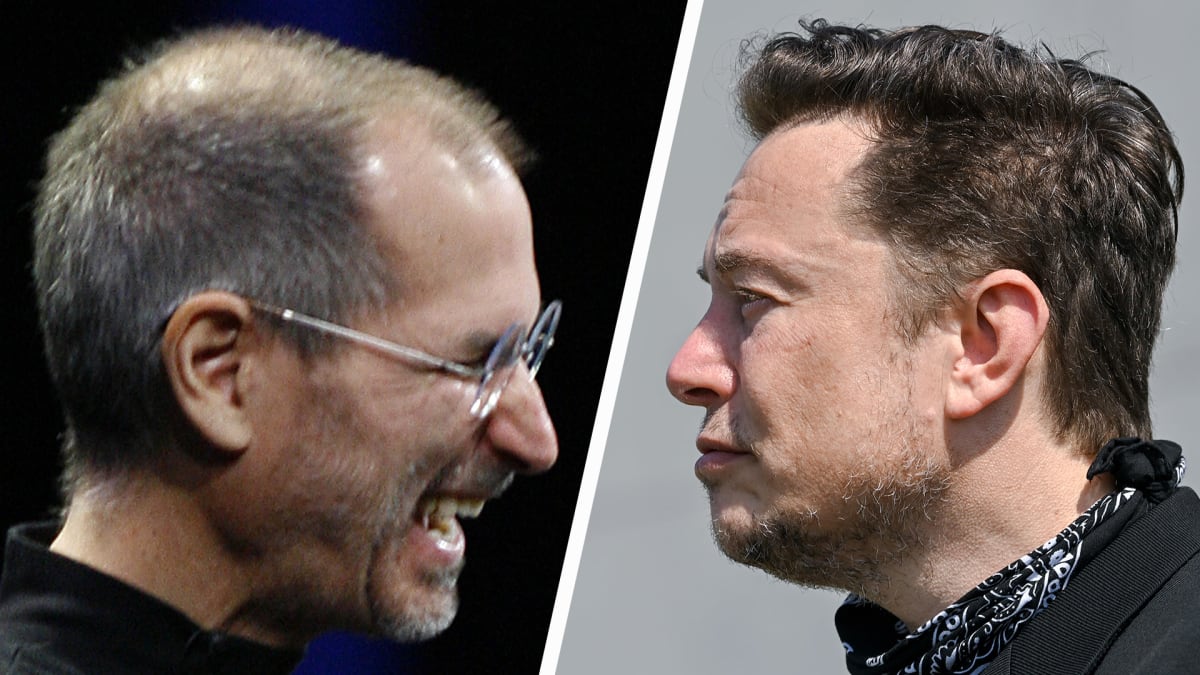
They are considered two of the greatest tech innovators of recent years.
One co-founded Apple and made it a household name. The iPhone is, for its users, consumers and even for Apple's competitors, the benchmark for smartphones.
The other co-founded Tesla and managed to make the electric-vehicle manufacturer a household name. When consumers talk about electric vehicles, it is rare not to hear the name Tesla.
Steve Jobs made Apple (AAPL) a global brand and reference. Elon Musk established Tesla (TSLA) as the pinnacle of the clean-vehicle industry worldwide.
Two Revolutionaries in Technology
Musk is and Jobs was a disruptor; they're two of the most innovative and revolutionary tech leaders of our time..
They changed the way we perceive the telephone and how we approach cars. They created an Apple ecosystem and a Tesla community, and the members of each are convinced that they are living a unique experience.
Yet the two men are often seen as opponents. They have fans who tend to think that their champion is the more revolutionary. For many experts, Jobs, who died in 2011, is the most revolutionary. That's a claim that Musk, who wants to colonize Mars in our lifetime, regularly disputes.
Be that as it may, the two men are in agreement on a key point, with regard to their approach to innovation. That's what Musk has just disclosed.
They agree that when you are a disruptor -- whether you are attacking a new or existing market -- the key quality is instinct and good judgment, not market research.
It all started with a thread on Twitter.
A Tesla fan posted an interview with Jobs, in which the Apple executive was asked about the role market researchers have played for him.
"Steve Jobs on market research," the Twitter user wrote on Feb. 14, posting a short video interview with Jobs.
"How important is market research? How much did you rely on it in the early days?" a young Jobs is asked.
'Instinct' and 'Good Judgment'
In his response, the former Apple CEO explained that instinct is what is needed when you want to disrupt an industry and create a completely new product.
"I think in the early days was very easy because you could go to a Homebrew Computer Club meeting and there was your whole market," he said.
"And so you could find out what they thought. In fact, you could show them your product and see what they thought. And because the products were much simpler then, within a few months you could change it all around and come back and show them a new one.
"But as the market got more sophisticated, it was less easy to do that. And the problem is that market research can tell you what your customers think of something you show them. Or it can tell you what your customers want as an incremental improvement on what you have. But very rarely can your customers predict something that they don't even quite know they want yet."
Such research looks at various metrics and assesses the overall direction of a company or the market. In the context of a product, that means researching competitors for similar products; safety reports, the conditions that can affect demand, anything that can provide information and enable informed decisions.
Companies also use market research to understand their customers and their needs as well as industry trends.
"No market research could have led to the development of the Macintosh or the personal computer in the first place," Jobs said.
"So there are these sort of nonincremental jumps that need to take place where it's very difficult for market research to really contribute much in the early phases of the thinking about how to, you know, what those should be."
He added that once a company has made progress, "before the product is on the market or even after is a great time to go check your instincts with the marketplace and verify that you're on the right track."
"And usually when you show people something, they'll say, 'oh my god, this is fantastic,' or give you some feedback along those lines."
Musk seems to share this opinion. He is of the opinion that instinct is what matters.
"There’s no substitute for good judgment," the billionaire said.
He's suggesting that when you break into a new market, it's difficult to assess what the consumers want because they themselves don't know,
Musk agrees with Jobs that even with all the research in the world, you still have to have good judgment in the decisions you make. And that sometimes comes down to your instincts.







